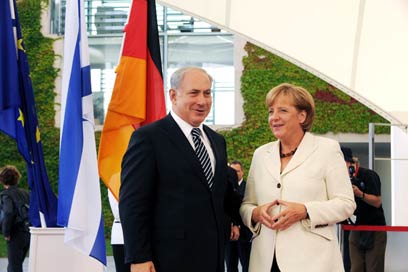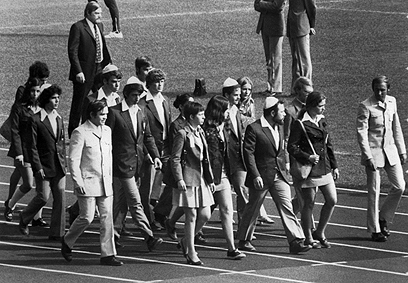|
|
This week, a ceremony marking 40 years of the brutal massacre will be held in Fürstenfeldbruck, with Israeli and German representatives, including survivors and families of those who were killed.
The ceremony will commemorate the victims, but will not relate to issues of historic and political responsibility.
In the past few weeks, German media has been rife with disturbing exposés of intelligence slip-ups and faulty judgments that led the Germans to completely disregard the magnitude of the threat that the members of the Israeli delegation were under.
The German weekly Der Spiegel ran an exposé recently, according to which the 1972 West Germany government not only released the Munich massacre terrorists, but also negotiated with Palestinian officials who were behind the massacre, in order to prompte trust with the PLO, so as to prevent future acts of terror from striking Germany.
Even today, Germany does not acknowledge its accountability in the massacre. Forty years later, one must ask what lies beneath diplomacy, and whether "Germany's special historical responsibility for Israel's security" – presented by Angela Merkel in her address to the Israeli Knesset, during her visit to Jerusalem in 2008 as "part of my country's raison d'etre" – is a true commitment, or merely lip-service.

Netanyahu and Merkel. 'Special historical responsibility for Israel's security'
According to an Israeli official, Germany benefits from maintaining ambiguity when it comes to relations with Israel: "Many in the current German administration believe that an unequivocal statement of commitment to Israel's defense may harm Germany's power on an international levelscene," he said.
The issue of commitment to Israeli security has manifested itself in recent public debates in Germany, mainly concerning over whether circumstances would ever compel Germany to send military aid to Israel. According to an Israeli official, that debate illustrates Berlin's misunderstanding of the concept of accountability. "We ever asked the Germans to send troops to protect us." he said.
So is Germany indeed Israel's closest ally – or the second-closest after the US? Though many believe that it is, Israeli officials have their doubts. Many in Jerusalem see Germany's statements relating to its commitment to the country's security as ones meant to merely reinforce Berlin's own national identity, by allowing people to see a "new Germany" that is working for peace. It is not Israel that Germans are concerned with; it is themselves – Israeli politicians believe.
The abyss
Oz Aruch, of the Department of Politics and International Studies at the University of Cambridge, has recently completed a dissertation titled "Germany's Commitment to Israel's Security.""As I was researching the subject, I saw the vast gap that divides Israel and Germany when it comes to issues of defense and security," Aruch told Yedioth Ahronoth, "specifically when it comes to each country's policy regarding Iran and Palestine.
"Each carries very different lessons from the Holocaust. Israelis say: 'We will never place our fate in the hands of others, which is why we are willing to break international law. State defense is a top priority for Israelis.' For the Germans, however, it's the other way around – international law prevails over everything."
"During the 1980s, people were very skeptic about Germany," Aruch asserted. "West Germany was not invited when celebrations marking 40 years since the end of World War II were held. In 1985, Germany decided to change its policy, and then-President Richard von Weizsäcker made a speech in which he referred to a "New Germany," which was designed to be the opposite of Nazi Germany.
Weizsäcker's speech gave birth to two reigning principles: Germany will promote peace in Europe and the world, based on international law, and will insist on pluralism, specifically towards Jews.
Chancellor Angela Merkel took even a step further when she stated that Germany is not only committed to the Jews, but also has a "historical responsibility for Israel's security", as part of Germany's "raison d'être".
When it comes to the Iranian issue, German policy indeed adheres to the principles of "New Germany." Germany's commitment to Israel's security is behind its supply of the Dolphin class submarines, aimed to deter (the Dolphin class submarines are supposed to provide Israel with an offshore second strike capability), and its promotion of diplomacy over military action complies with its commitment to peace.
Germans really see a modern Hitler in Ahmadinejad, as he uses the most primitive anti-Semitic slogans," Aruch adds. "That is why they can relate to Israel's fear of Iran."
But whenever the practicalities are discussed, the distinction between German and Israeli policies arises. Whereas the Germans push for political sanctions and are apprehensive in regards to a strike, surely not without the approval of the UN Security Council, Israel discusses strike.
The true collision, however, between German and Israeli policies, occurs when it comes to the Palestinian issue.
"The Germans loved the Olmert- Livni administration and saw the Palestinians and Hamas as the 'bad kids in the hood.' But once the Israeli and American governments changed, the Merkel administration took a sharp turn in its perception of Israel. As far as the Germans are concerned, Netanyahu isn't really interested in peace or in two states for two nations, which conflicts with the Germans' perception of themselves as promoting peace."
To resolve the contradiction between Germany's commitment to Israel's security and its opposition to Israeli policy in regards to the Palestinians, the Germans argue that security can only be achieved when peace is accomplished, and in withholding peace, Israel is damaging its own security. That criticism of Israeli policy is a result of a concern for Israel's security. "They see Israel as a good friend who's gone mad, and needs to be saved from self-inflicted damage," Aruch explains.
According to reports of German media, the Obama administration turned to Merkel insisting that Germany cool its warm relations with Israel, as part of diplomatic efforts to influence the Netanyahu administration.
Since she assumed office, Merkel has been focusing on the eurozone and has entrusted Middle East issues in the hands of diplomat Christoph Heusgen. Heusgen has been Merkel's advisor on foreign and security policy since 2005, and belongs to a generation of diplomats who were born after WWII.
In Israel, many believe that Heusgen is trying to align German policy toward Israel with EU policy. Some even define him as "insensitive to the unique ties between Germany and Israel," to the extent that he "cannot see the need for a German commitment toward Israel."
When Merkel first took office, Israel seemed to have close ties with the chancellor, mainly due to the personal friendship between Shimon Stein, Israeli ambassador to Germany at the time, and the chancellor herself. Merkel was the first European leader to instill a joint Israeli-German Future Forum, including annual consultations between the two governments.

Memorial service at the 1972 Munich Olympics after the slaughter. Germany does not acknowledge its accountability
Nowadays, the personal ties no longer exist – greatly due to a lack of chemistry between Merkel and Netanyahu – and Germany's diplomatic relations with Israel are predominantly conducted through Heusgen's office. The results of the looser political ties are evident: Governmental consultations slated to set in January 2012 were repeatedly postponed by the Germans under various excuses, and will probably take place only in December 2012. The annual forums turned into biennial forums.
Thus the German government led by the chancellor who was the friendliest toward Israel in German history became the most alienated from Israel in German history.
"German politics holds a very negative attitude toward Israel nowadays," said an Israeli representative involved in German-Israeli politics. "There is no official decision to end the special relations between the two countries, but there's a change in the general atmosphere."
The German government nonetheless discusses its commitment to Israel's security in order to promote its own interests. Just recently, a Syrian opposition activist tried to convince the Germans to toughen their stand toward Assad's regime during a closed meeting at the Foreign Office in Berlin.
"We were surprised to hear from the Germans that they won't do it so as to refrain from jeopardizing Israeli interests," the activist commented. "It was clear to us that it was an excuse for not taking a stand, regardless of Israel. The Germans were not interested in complying, so they made it into an Israel issue. It's clear as day that Israel would benefit from Assad stepping down and Syria becoming a democracy."
When the German government decided to sell a few hundreds Leopard tanks to Saudi Arabia – a $10 billion deal – the Germans were quick to explain that breaking the ban to sell German weapons to areas of conflict was meant to maintain "Israel's security" in face of the Iranian threat. That argument left Jerusalem stunned, especially due to the fact that following the Marmara raid a year earlier, the Germans condemned Israel for nonproportional use of force and demanded that Israel remove the curfew over Gaza, without taking into account the defense risk it might impose on Israel.
In the meantime, further weapon deals have been concocted between Germany, Qatar and Algeria. It appears that peace-keeping is no longer a top priority in times of economic crisis. Qatar has expressed interest in purchasing 200 tanks valued €2 billion. Algeria is slated to buy frigates, armored personnel carriers and security systems for their borders, all amounting to €10 billion. All three countries – Saudi Arabia, Qatar and Algeria – are not democracies, nor are they considered dear friends of Israel.
Israel Kritiker
A few days following the Fürstenfeldbruck ceremony, Frankfurt will be holding the Theodor W. Adorno Award ceremony. The latter is given to those who have made outstanding achievements in philosophy, music, theater and film. This year, the €50,000 award is bestowed to American philosopher and gender scholar Judith Butler.In recent years, Butler has become known as leading activist calling to boycott Israel and Israeli institutions, promoting a binational state, and perceiving Hamas and Hezbollah as "social movements that are progressive… that are part of a global Left."
The decision to award the prestigious prize, named after a half-Jewish scholar who fled Nazi Germany, to a person so anti-Israel has outraged Israeli and Jewish figures. The Israeli embassy in Germany and heads of the Jewish community have expressed outspoken protest. Though the award is not granted by the German government, many in Israel see it as yet another manifestation of the deterioration of the Israel-Germany ties.
Butler is a member of the Israel Kritiker ("Israel Critic"), a group of anti-Israel activists, including Jews and Israelis. The new mayor of Frankfurt, Peter Feldmann – the first Jewish mayor of Frankfurt since the Holocaust – will not be present at the award ceremony.
Nicola Galliner, whose parents fled Nazi Germany and settled in the UK, is running the Berlin-Potsdam Jewish Film Festival. Unlike the Berlin International Film Festival, which often presents the Israeli issue in a critical manner, the Jewish Film Festival offers a more sympathetic approach to Israel. It seems, however, that festival sponsors are not fond of the outspoken support for Israel, as Galliner was told that the festival was "not German enough."
As far as public atmosphere is concerned, it thus seems that anti-Israeli cultural events are supported by the government, protecting poetic license and freedom of speech, whereas pro-Israeli events are disregarded.

Berlin International Film Festival. Presents the Israeli issue in a critical manner (Photo: AFP)
"The Germans have been increasingly working toward creating a distinction between Israel and the Jews," a senior Israeli official stated. "It's a way for them to alienate themselves from Israel and deal with their responsibility to the Holocaust. It's easy for them to say: look what are victim is doing. Not all Jews, of course – that would be anti-Semitic – but the Israelis. And we're a very unpleasant victim. We're aggressive, violent, as we sometimes have to be given the Middle East reality around us, and that allows Germany to criticize and boycott Israel."
During a visit to Hebron, Sigmar Gabriel, chair of the Social Democratic Party of Germany, who may be the next German chancellor, said that Israel was running an "apartheid regime." According to the Israeli official, "We are approaching elections, and the German left will undoubtedly blame Chancellor Merkel with blind loyalty to Israel, which will force her to steer clear of Israel even more so than she has in recent years."
Anti-Israeli academia
Key players in the divide gaped between Germany and Israel are scholars of Middle-East and Islam studies. Members of the academia are involved in lobbying and often advise decision makers to strengthen bonds with Arab countries and loosen ties with Israel.According to Dr. Clemens Heni, an internationally known scholar on anti-Semitism, "there is pro-Islamic and pro-Arab lobby in German academia, and it is mostly anti-Israeli. Recently, some have promoted the notion that Islamists, specifically the Muslim Brotherhood, are moderate reformists. They are presented as harmless, in complete disregard to their hatred of Jews and their violent methods."
"Take, for example, the German Institute for International and Security Affairs (SWP), which is one of Europe's leading think tanks. Head of the SWP Middle East Division has announced that Israel should not be a Jewish state. She and her colleagues do not refer to themselves as anti-Israeli, but they want Israel to be a binational state, and try to influence German politicians."
According to Heni, "Anti-Israel stands in Germany are stronger than they were in the early '70s, during the Munich massacre. At the time, anti-Semitic and anti-Israeli activists belonged to small radical groups, but today the anti-Israeli and anti-Zionist position is prevalent amongst the entire German population. It's no longer marginal groups; it is the mainstream of German politics and academia."
No comments:
Post a Comment